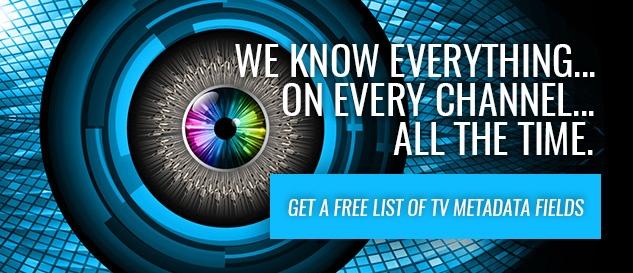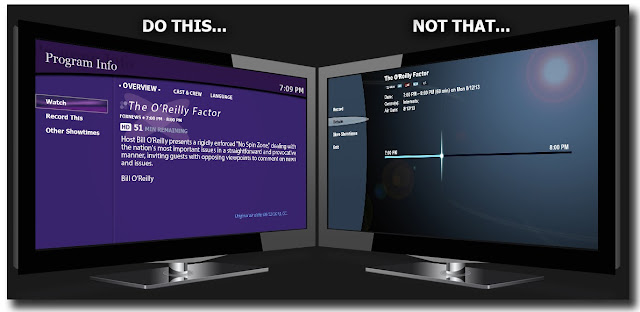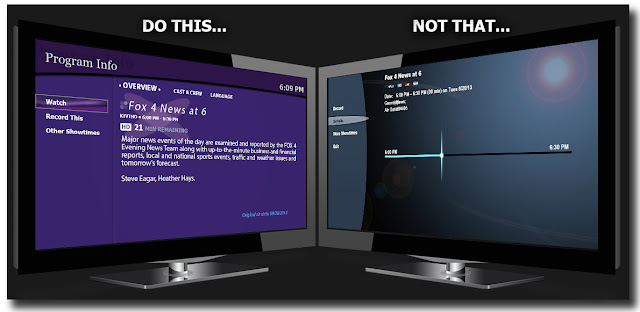OK, before we start talking about the ins and outs of
Electronic Program Guide screens—let’s start by thinking about the subject at
hand. News.
Traditionally, “news” means bringing someone the most
up-to-date, late-breaking information. In fact, keeping people informed is what
the news is all about.
Therefore, when a news EPG screen is uninformed, that’s not
a good thing.
Here are just a few of the pitfalls of news EPG screens,
ripped from today’s headlines, along some tips on how to make sure viewers
always get the scoop…
For example, just check out the screen we’ve provided. (Just click on the images to increase their size for your
review.) “CBS 11 News at 6PM” could, we suppose, be a news program. But
without a description on appropriate genre of some kind to be specific? We’re
left to wonder whether that’s the CBS national network news, or a local
program.
In our “good” example, the description informs the viewer
that the program is daily, and covers business, sports, weather and traffic.
The genres also inform the viewer that the program covers sports, news, and
weather. Clearly a typical local news broadcast.
Failure to have even a standard and robust description
leaves a viewer in limbo. And viewers really don’t like limbo.
Confusing Genre.
Now, most people who watch news know who Bill O’Reilly is. And, most people who watch news know that his show is called The O’Reilly Factor.
Now, most people who watch news know who Bill O’Reilly is. And, most people who watch news know that his show is called The O’Reilly Factor.
But what if you’re not all that newsy? The O’Reilly Factor
could be a reality show, a sci-fi movie, or any number of other kinds of
programs. Now imagine looking at the genre section to see what the program
might be about and there you see…"Interests."
Just like in this screen above.
Interests? This one has us very, very confused. Everything
on earth, by definition, is an “interest” and we have never one time in our
entire lives heard someone say, “I watched this awesome interests show last
night!” or “Didja catch that groovy show about interests on Fox last night?”
Doesn’t really seem part of the everyday lexicon, does it?
Rather than a vague, unusable catch-all, a genre or category
should specifically identify an attribute of a program to, as always, inform a
viewer decision.
Because confusion is also something that is traditionally
NOT part of broadcast news journalism.
No Distinction Between News & News Analysis.
Do you watch Rachel Maddow or Bill O’Reilly for objective, unbiased news reporting on the full breadth of the latest breaking news stories?
Do you watch Rachel Maddow or Bill O’Reilly for objective, unbiased news reporting on the full breadth of the latest breaking news stories?
Or, do you watch them for their take on the news—and their
particular brand of presenting their opinions? We’re going to bet it’s the
latter. Because there is a big difference between a news broadcast, and news
analysis and commentary.
And, that difference should be explicitly obvious in an EPG
description. You know, that pesky “always inform the viewer” standard. But, as
you can see in our bad example about Erin Burnett OutFront, above, it’s not clear at all.
Our good example, as you might expect, goes above and beyond
the call of duty to classify Erin Burnett’s program as just what it is. Not
exactly the news, but a hodge-podge of news and social topics in a
talk/interview format.
If you’d like an expert opinion, an EPG news program screen
should differentiate between opinion and hard news.
No Guests Or
Panelists Listed.
Some of the most stimulating news programming available features roundtable discussions with panels of experts.
Some of the most stimulating news programming available features roundtable discussions with panels of experts.
Knowing who those experts might be—or even that the show is
in such a format—immediately differentiates that program for other news
offerings like local news, national network news, or a news magazine format
like 60 Minutes.
In the description alone, the good screen indicates that the
show is hosted, moderated, and features both a panel and regular guests.
Meanwhile, the bad screen leaves the viewer adrift, bereft of any hope of
guiding information. Which is kind of what an Electronic Program GUIDE is for,
isn’t it?
Don’t worry. We’re starting a panel discussion on this, and
when we do we’ll make sure you know it in our description.
No Listing Of Host Or
Anchor.
Personalities—big bold ones—shape the world of news opinion and commentary.
Personalities—big bold ones—shape the world of news opinion and commentary.
Because, if you look at the screens above, you’ll see that
the only germ of evidence the bad screen gives us that Sean Hannity hosts the
program is the last name “Hannity”.
Which could be the name of an old John Wayne detective film,
a fine musical set in the 1920’s about a family of stage performers from
Ireland, or maybe a show about politics.
In the good example, there’s no question as to what the
show—and the host—is about.
Big pundits make big news and garner big attention. Make
sure even the uniformed know who’s running the show.
No Local Designation.
Your local news is probably one of the local station’s most prominent, profitable, and most-viewed programs.
Your local news is probably one of the local station’s most prominent, profitable, and most-viewed programs.
But if you don’t know it’s local? Sort of ruins the whole
point—particularly with the huge array of national news content available.
Local news affects people where they live. Proximity draws
people together along the lines of important news, sports, and weather that are
unique to a geographic area.
Just look at the two listings approaches. One good. One bad.
Just look at the two listings approaches. One good. One bad.
The bad one? Basically just tells you there’s some sort of
news program on at 6 PM. And also provides a massively confusing air date.
The good screen goes above and beyond the call. It
designates the local news team, talks about up-to-the-minute reports, and
brings in tomorrow’s forecast. It’s telling the viewer at every opportunity
that the show is local—and therefore automatically pertinent to some degree.
As always, completeness and ease of understanding should
drive informing the viewer.
Casually applying just the bare information
necessary isn’t maximizing the EPG as the wonderful informational tool it is
for television viewers.
Until next time, this is your FYI News Team, signing off
from an EPG near you.














Post a Comment